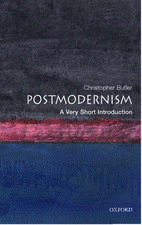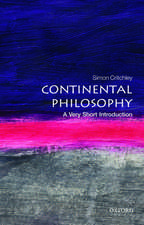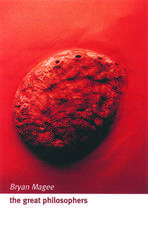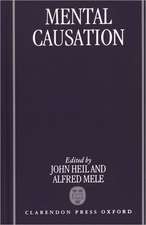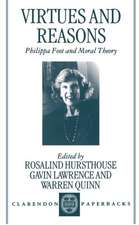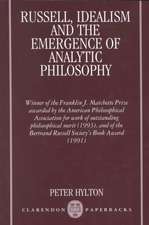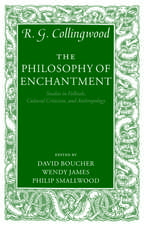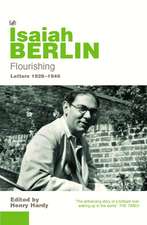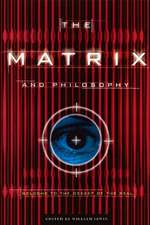The Enlightenment and the Intellectual Foundations of Modern Culture
Autor Louis Dupréen Limba Engleză Paperback – noi 2005
An eminent scholar of modern culture argues that the Enlightenment―the importance of which has been vigorously debated in recent years―was a more complex phenomenon than either its detractors or advocates assume.
Preț: 313.56 lei
Nou
Puncte Express: 470
Preț estimativ în valută:
60.01€ • 65.16$ • 50.41£
60.01€ • 65.16$ • 50.41£
Carte tipărită la comandă
Livrare economică 22 aprilie-06 mai
Preluare comenzi: 021 569.72.76
Specificații
ISBN-13: 9780300113464
ISBN-10: 0300113463
Pagini: 416
Dimensiuni: 156 x 235 x 29 mm
Greutate: 0.61 kg
Editura: Yale University Press
Colecția Yale University Press
ISBN-10: 0300113463
Pagini: 416
Dimensiuni: 156 x 235 x 29 mm
Greutate: 0.61 kg
Editura: Yale University Press
Colecția Yale University Press
Recenzii
“Louis Dupré’s study of the Enlightenment, ranging as it does over art, morality, religion, science, philosophy, social theory, and a good deal besides, is a marvel of scholarly erudition. . . . A formidably well-researched book, which would make an excellent introduction to Enlightenment ideas for the general reader.”—Terry Eagleton, Harper’s Magazine
“In The Enlightenment, Dupré fully meets the high expectations raised by his earlier Passage to Modernity.”—Stijn Van den Bossche, Tertio
“[Dupré] conceives [the Enlightenment] not as a static program, but as a dynamic, even dialectical one. Thanks to this comprehensiveness, his intellectual portrait of the Enlightenment, as fascinating as it is learned, gains in depth and scope.”—Arnold Heumakers, NRC Handelsblad
“Dupré’s book is highly recommendable to both professors and graduate students specializing in modern European intellectual history, as well as for those approaching the eighteenth century for the first time. Its breadth and depth are simply enviable, as is the author’s ability to discern important ideas from accessory ones. In this sense, the book works as both a manual and a critical study. Written in an accessible style despite its erudition, this contribution should leave a long-lasting mark in the field of eighteenth-century studies.”—Ricardo Miguel Alfonso, Atlantis
“A monumental work.”—Choice
“This book calls to mind the fine book that was its predecessor, Passage to Modernity (1993), and it shows the same excellences we find in the previous volume. It is a book of admirable erudition which nevertheless is carried very lightly. It is full of insightful detail, and there are fine discussions of a whole host of significant individual thinkers.”—William Desmond, The Thomist
“A fantastic overview of the philosophical, political, social, and religious thought of a number of major and minor Enlightenment figures. . . . For those seeking an insightful and comprehensive overview of Enlightenment thought across all levels of society, Dupré’s analysis is an excellent and highly recommended place to begin.”—Scott Breuninger, H-Net Reviews
“Readable, comprehensive. . . . Dupre is not just an articulate, well-informed guide to a great variety of different views but wrestles with the question of the future role of religion.”—Karsten Harries, Journal of Religion
“Louis Dupré scores highly with this, his latest analysis of the Enlightenment epoch.”—Patrick J. Hayes, Catholic Historical Review
“This immensely readable book will cause readers to rethink the Enlightenment and to see its positive aspects. It will also add crucial historical perspective to current discussions of modernity.”—Donald Verene, Emory University
“In The Enlightenment, Dupré fully meets the high expectations raised by his earlier Passage to Modernity.”—Stijn Van den Bossche, Tertio
“[Dupré] conceives [the Enlightenment] not as a static program, but as a dynamic, even dialectical one. Thanks to this comprehensiveness, his intellectual portrait of the Enlightenment, as fascinating as it is learned, gains in depth and scope.”—Arnold Heumakers, NRC Handelsblad
“Dupré’s book is highly recommendable to both professors and graduate students specializing in modern European intellectual history, as well as for those approaching the eighteenth century for the first time. Its breadth and depth are simply enviable, as is the author’s ability to discern important ideas from accessory ones. In this sense, the book works as both a manual and a critical study. Written in an accessible style despite its erudition, this contribution should leave a long-lasting mark in the field of eighteenth-century studies.”—Ricardo Miguel Alfonso, Atlantis
“A monumental work.”—Choice
“This book calls to mind the fine book that was its predecessor, Passage to Modernity (1993), and it shows the same excellences we find in the previous volume. It is a book of admirable erudition which nevertheless is carried very lightly. It is full of insightful detail, and there are fine discussions of a whole host of significant individual thinkers.”—William Desmond, The Thomist
“A fantastic overview of the philosophical, political, social, and religious thought of a number of major and minor Enlightenment figures. . . . For those seeking an insightful and comprehensive overview of Enlightenment thought across all levels of society, Dupré’s analysis is an excellent and highly recommended place to begin.”—Scott Breuninger, H-Net Reviews
“Readable, comprehensive. . . . Dupre is not just an articulate, well-informed guide to a great variety of different views but wrestles with the question of the future role of religion.”—Karsten Harries, Journal of Religion
“Louis Dupré scores highly with this, his latest analysis of the Enlightenment epoch.”—Patrick J. Hayes, Catholic Historical Review
“This immensely readable book will cause readers to rethink the Enlightenment and to see its positive aspects. It will also add crucial historical perspective to current discussions of modernity.”—Donald Verene, Emory University
Notă biografică
Louis Dupré (1925–2022) was T. L. Riggs Professor Emeritus of Philosophy of Religion at Yale University. He is also the author of Passage to Modernity: An Essay in the Hermeneutics of Nature and Culture and Marx’s Social Critique of Culture.

